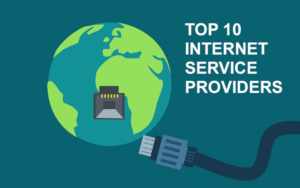In Los Angeles — where streaming, remote work, point-of-sale systems, video conferencing and cloud workloads all run simultaneously — picking the right business internet provider is mission-critical. Below are 10 top choices for LA businesses in 2025, chosen for coverage, speed options (including fiber and 5G), dedicated business products, and business-focused extras like SLAs, static IPs, and backup options.
Table of Contents
Toggle1. Spectrum Business — Best for broad cable coverage and simple pricing
Spectrum Business offers cable-based plans with high download speeds (500 Mbps–1 Gbps commonly available) and business packages that include built-in support and optional backup services. It’s widely available across the city and is a solid choice for storefronts, offices, and hybrid workplaces that need high downstream capacity without lengthy buildouts. Spectrum+1
Pros: Wide availability, competitive cable gig options, managed support add-ons.
Cons: Upload speeds can be asymmetric (typical cable behavior) vs. pure fiber.
Best for: Retail stores, small-to-medium offices, businesses that need broad availability.
2. AT&T Business / AT&T Fiber — Best for large-scale fiber and fast symmetrical speeds
AT&T has massively expanded fiber availability and advertises multi-gig options (including up to 5 Gbps in select areas). For businesses that need symmetrical fiber performance, guaranteed business SLAs, or wireless+fiber bundles, AT&T is a top contender — pending address-level availability. AT&T
Pros: True fiber, symmetrical multi-gig tiers, enterprise-grade add-ons.
Cons: Fiber availability still varies block-by-block; pricing for dedicated circuits can be higher.
Best for: Tech companies, data-heavy offices, businesses needing symmetrical performance.
3. Verizon Business (5G & Fiber) — Best for wireless failover and 5G business connectivity
Verizon provides both fiber (where available) and 5G Business Internet options — excellent as a primary or resilient backup connection. Their 5G Business offerings can be particularly useful for pop-up locations, branch offices, or as a quick-deploy primary line with low installation overhead. Verizon
Pros: Fast 5G deployment, strong mobility footprint, enterprise-grade solutions.
Cons: 5G performance depends on local coverage and indoor signal; not a full replacement for fiber for large-scale uploads.
Best for: Retail pop-ups, resilient WAN setups, remote/temporary offices.
4. Comcast Business / Xfinity Business — Best for balanced speed + local support
Comcast Business (Xfinity Business) offers a range of business internet tiers, from basic business plans to dedicated circuits and symmetrical business packages. They emphasize 24/7 support and options for dedicated internet access for businesses that need consistent SLAs. Comcast’s wide footprint in LA makes it an obvious mainstream choice. Comcast Business+1
Pros: Wide availability, flexible plans, dedicated internet options.
Cons: Customer experiences vary regionally; promotional pricing can change after promos.
Best for: Small-to-medium businesses looking for predictable local support and good speeds.
5. Astound Business (formerly RCN/Grande/Wave family) — Best for fiber-forward midmarket options
Astound Business has been rapidly expanding and markets fiber-powered solutions with gig and multi-gig options in many metro areas. They’re increasingly visible as a competitive fiber/cable alternative to the legacy incumbents and worth checking for competitive pricing and local promotions. Astound+1
Pros: Aggressive pricing, growing fiber availability, business-focused solutions.
Cons: Coverage footprint is still growing by neighborhood.
Best for: Medium businesses seeking fiber speeds without enterprise pricing.
6. Frontier Business — Best for fiber in select neighborhoods and bundled security tools
Frontier offers fiber business plans and business suites that include router/Wi-Fi and security features. In LA, Frontier continues to expand fiber availability in targeted areas and is a good option where fiber is already deployed. Frontier
Pros: Fiber options, bundled business services (Wi-Fi, basic security).
Cons: Availability is patchy in some ZIP codes; enterprise builds may take time.
Best for: Offices in Frontier fiber zones, businesses wanting bundled security tools.
7. Lumen (CenturyLink enterprise offerings) — Best for enterprise WAN, dedicated circuits, and cloud connectivity
Lumen focuses on enterprise and carrier-grade services (dedicated circuits, Ethernet services, and cloud connectivity). Their Internet On-Demand and high-performance WAN products make them a good fit for companies with complex networking needs or multi-site WANs. Lumen
Pros: Carrier-grade services, strong enterprise portfolio, flexible on-demand connectivity.
Cons: Overkill (and higher cost) for small shops that only need simple broadband.
Best for: Enterprises, multi-site companies, firms needing low-latency cloud links.
8. Cogent Communications — Best for scalable bandwidth and carrier connectivity
Cogent is a backbone/carrier provider that offers affordable, high-capacity business internet and is often used by ISPs and enterprises needing large bandwidth on Ethernet/DIA (Dedicated Internet Access). For businesses that need raw, affordable bandwidth and peering advantages, Cogent is a practical option. cogentco.com
Pros: Cost-effective high bandwidth, carrier-grade peering.
Cons: Customer service & on-site provisioning expectations differ from consumer ISPs.
Best for: High-bandwidth enterprise customers, data centers, hosting providers.
9. RCN / Regional Business ISPs — Best for flexible wireless backup & managed wireless
RCN (and other regional players) offer business internet and 5G/LTE wireless business solutions, plus managed services and fast deployment for sites that can’t wait for fiber builds. They can also provide backup connectivity and are useful when redundancy is a priority. RCN Technologies
Pros: Fast deployment, managed support, wireless failover options.
Cons: Wireless speeds vary by location; may require a managed plan for best reliability.
Best for: Branch offices, redundancy setups, businesses in areas awaiting fiber.
10. Local/Hybrid Solutions & Resellers — Best for specialist needs and managed services
Los Angeles has many specialists and local integrators who resell or combine the above carriers into resilient solutions (bonded circuits, SD-WAN, managed firewalls, VoIP bundles). If you have specific uptime, security, or multi-site routing needs, a local MSP or connectivity reseller can design a tailored, cost-effective stack. (Look for partners who can provision Metro Ethernet, DIA, or SD-WAN.)
Pros: Tailored solutions, single vendor for complex stacks.
Cons: Adds a management layer and cost; choose an MSP with strong references.
Best for: Multi-site businesses, hospitality chains, healthcare offices with compliance needs.

How to choose the right one for your LA business
-
Start with a site availability check. Fiber and some business products are street-by-street; always check address-level availability. AT&T+1
-
Prioritize symmetrical speeds for heavy uploads. If you back up to cloud or host services, symmetrical fiber or dedicated circuits will pay off. AT&T+1
-
Buy redundancy. Pair a primary fiber or cable line with a 5G or LTE business line for quick failover (Verizon, RCN, or other managed wireless options). Verizon+1
-
Read the SLA and support terms. Business SLAs, repair windows and 24/7 support matter more than a few dollars when your business depends on connectivity. Comcast Business+1

